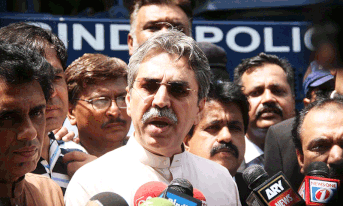ISLAMABAD: The Supreme Court on Friday declined a request by former Senate chairman Mian Raza Rabbani to constitute a bench comprising all its judges to hear a case relating to devolution of health institutions after the 18th Amendment.
“Bearing in mind the sensitivity of the issue pertaining to the 18th Amendment and by taking precautionary measures and also realising that time was an issue before the present five-member bench, it will be in the fitness of things if the case is heard by a full court,” argued Mr Rabbani.
But Justice Ijazul Ahsan, a member of the five-judge bench, observed that vires of the 18th Amendment were not in question before the Supreme Court.
Raza Rabbani wanted the hospitals’ management matter to be heard by all judges of the apex court instead of the five-member bench
The bench had taken up a constitution petition seeking management control of three hospitals — the Jinnah Postgraduate Medical Centre (JPMC), National Institute of Cardio-Vascular Diseases (NICVD) and National Institute of Child Health (NICH) — since the subject of health had been devolved to provinces after the 18th Amendment.
Once bitten, twice shy, retorted Mr Rabbani representing the NICVD, and recalled how at the time of the 18th Constitution Amendment, the Supreme Court had issued a short order in response to which parliament had to pass the 19th Constitution Amendment. Subsequent to which petitions were filed before the Supreme Court and as a result, the Parliamentary Committee, established under Article 175A of the Constitution for the appointment of judges, became redundant.
“I am sure that the Supreme Court will come out with a judgement in this case while taking care of all issues but interpretation flowing out of such verdict may become problematic,” the counsel argued.
On Friday, the Supreme Court also issued a notice to the Punjab government regarding a similar situation about the Sheikh Zayed hospital in Lahore and postponed further proceedings for Monday next.
Referring to a query raised by the Supreme Court whether the federal government could construct and run a hospital in any province if it wished to do so, the counsel cited Articles 97, 137 and 142 of the Constitution, adding that from the collective reading of these articles it became clear that it was the legislative competence which determined the executive competence.
The hospitals and health in all the constitutional documents from the Government of India Act, 1935, have been on the provincial list and after the 1962 constitution they have become residuary subjects.
During the hearing, the chief justice observed that what the counsel was advancing was that running of hospitals should be left to the provinces and that the poor people of the province should be left to the mercy of the provinces if they did not decide to set up health facilities.
And once the federal government built a hospital to fill the vacuum, the executive authority must be given to the province to run the establishment, the chief justice observed.
The counsel said that Article 142 suggested that the legislative competence in terms of hospitals and health was exclusively of the province. And since the legislative competence of the hospitals and health was with the province, therefore the executive competence would also be with the province.
The intention of the legislature in keeping hospitals and health with the province is evident from the constitution of 1962, wherein other lists were dropped except for the State list and deliberately hospitals and health were made residuary subjects.
Similarly in the 1973 Constitution and the 18th Amendment where a class of hospitals was to be given to the federal government, the counsel argued, it was so mentioned in the Entry 16 of the federal legislative list.
Mr Rabbani stated that if the federal government began to trespass into the constitutional domain of provinces on the basis of perception that it could do better, then the federal scheme of the 1973 Constitution as well as the parliamentary structure and the provincial autonomy would go to the winds.
It would then be better to amend the Constitution and introduce a presidential and unitary form of government so that at least the sanctity of the Constitution is maintained, the counsel contended.
By retaining the administrative control of these hospitals, the federal government had done a constitutional wrong and a wrong could not be allowed to be perpetuated, he contended.
Published in Dawn, January 5th, 2019















































